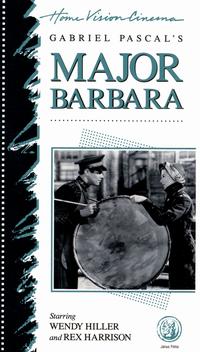
The Lady Eve is a 1941 American screwball comedy film written and directed by Preston Sturges and starring Barbara Stanwyck and Henry Fonda.
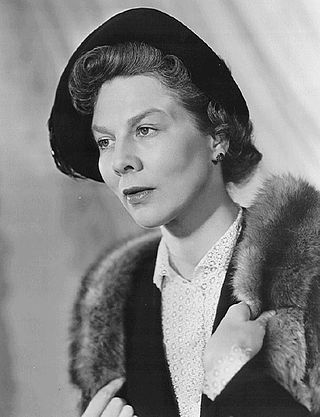
Dame Wendy Margaret Hiller, was an English film and stage actress who enjoyed a varied acting career that spanned nearly 60 years. Writer Joel Hirschorn, in his 1984 compilation Rating the Movie Stars, described her as "a no-nonsense actress who literally took command of the screen whenever she appeared on film". Despite many notable film performances, Hiller chose to remain primarily a stage actress.

Sir Reginald Carey "Rex" Harrison was an English actor. Harrison began his career on the stage in 1924. He made his West End debut in 1936 appearing in the Terence Rattigan play French Without Tears, in what was his breakthrough role. He won his first Tony Award for Best Actor in a Play for his performance as Henry VIII in the Broadway play Anne of the Thousand Days in 1949. He returned to Broadway portraying Professor Henry Higgins in My Fair Lady (1956) where he won the Tony Award for Best Actor in a Musical.
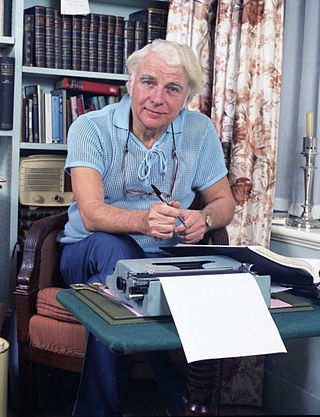
George Emlyn Williams, CBE was a Welsh writer, dramatist and actor.
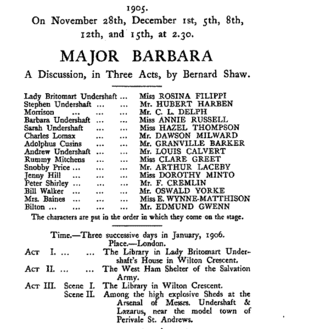
Major Barbara is a three-act English play by George Bernard Shaw, written and premiered in 1905 and first published in 1907. The story concerns an idealistic young woman, Barbara Undershaft, who is engaged in helping the poor as a Major in the Salvation Army in London. For many years, Barbara and her siblings have been estranged from their father, Andrew Undershaft, who now reappears as a rich and successful munitions maker. The father gives money to the Salvation Army, which offends Barbara because she considers it "tainted" wealth. The father argues that poverty is a worse problem than munitions and claims that he is doing more to help society by giving his workers jobs and a steady income than she is doing by giving people free meals in a soup kitchen.
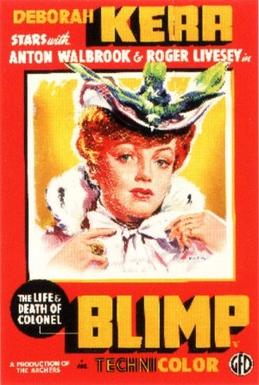
The Life and Death of Colonel Blimp is a 1943 British romantic-war film written, produced and directed by the British film-making team of Michael Powell and Emeric Pressburger. It stars Roger Livesey, Deborah Kerr and Anton Walbrook. The title derives from the satirical Colonel Blimp comic strip by David Low, but the story is original. One film critic has described it as "England's greatest film ever" and it is renowned for its sophistication and directorial brilliance as well as for its script, the performances of its large cast and for its pioneering Technicolor cinematography. Among its distinguished company of actors, particular praise has been reserved for Livesey, Walbrook and Kerr.

Genevieve is a 1953 British comedy film produced and directed by Henry Cornelius and written by William Rose. It stars John Gregson, Dinah Sheridan, Kenneth More and Kay Kendall as two couples comedically involved in a veteran automobile rally.
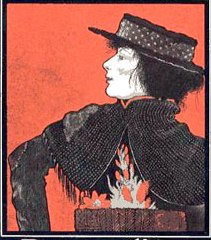
Pygmalion is a play by Irish playwright George Bernard Shaw, named after the Greek mythological figure. It premièred at the Hofburg Theatre in Vienna on 16 October 1913 and was first presented on stage in German. Its English-language première took place at His Majesty's Theatre in London's West End in April 1914 and starred Herbert Beerbohm Tree as phonetics professor Henry Higgins and Mrs Patrick Campbell as Cockney flower-girl Eliza Doolittle.

A Yank in the R.A.F. is a 1941 American black-and-white war film directed by Henry King and starring Tyrone Power and Betty Grable. Released three months before the attack on Pearl Harbor plunged the United States into World War II, it is considered a typical early-World War II production. Originally titled The Eagle Squadron, it is based on a story by "Melville Crossman", the pen name for 20th Century Fox studio chief Darryl F. Zanuck. It follows an American pilot who joins the Royal Air Force (RAF), during a period when the United States was still neutral.

Unfaithfully Yours is a 1948 American screwball black comedy film written and directed by Preston Sturges, and starring Rex Harrison, Linda Darnell, Rudy Vallée and Barbara Lawrence. The film is about a jealous symphony conductor who imagines three different ways to deal with the supposed infidelity of his beautiful wife—murder, forbearance, and a suicidal game of Russian roulette—during a concert of three inspiring pieces of classical music. At home, his attempts to bring any of his fantasies to life swiftly devolve into farce, underscored with humorous adaptations of the relevant music. Although the film, which was the first of two Sturges made for Twentieth Century-Fox, received mostly positive reviews, it was not successful at the box office.
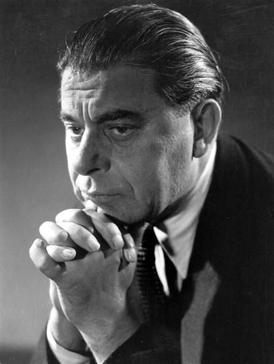
Gabriel Pascal was a Hungarian film producer and director whose best-known films were made in the United Kingdom.
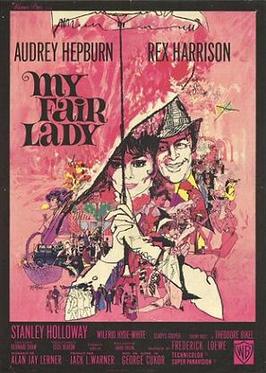
My Fair Lady is a 1964 American musical comedy-drama film adapted from the 1956 Lerner and Loewe stage musical based on George Bernard Shaw's 1913 stage play Pygmalion. With a screenplay by Alan Jay Lerner and directed by George Cukor, the film depicts a poor Cockney flower-seller named Eliza Doolittle who overhears an arrogant phonetics professor, Henry Higgins, as he casually wagers that he could teach her to speak "proper" English, thereby making her presentable in the high society of Edwardian London.

Pygmalion is a 1938 British film based on the 1913 George Bernard Shaw play of the same name, and adapted by him for the screen. It stars Leslie Howard as Professor Henry Higgins and Wendy Hiller as Eliza Doolittle.
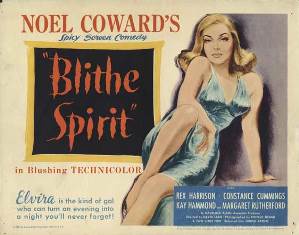
Blithe Spirit is a 1945 British supernatural comedy film directed by David Lean. The screenplay by Lean, cinematographer Ronald Neame and associate producer Anthony Havelock-Allan, is based on Noël Coward's 1941 play of the same name, the title of which is derived from the line "Hail to thee, blithe Spirit! Bird thou never wert" in the poem "To a Skylark" by Percy Bysshe Shelley. The song "Always", written by Irving Berlin, is an important plot element in "Blithe Spirit".
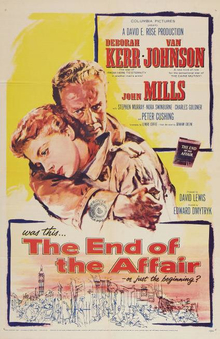
The End of the Affair is a 1955 British-American drama romance film directed by Edward Dmytryk, based on Graham Greene's 1951 novel of the same name. The film stars Deborah Kerr, Van Johnson, John Mills and Peter Cushing. It was filmed largely on location in London, particularly in and around Chester Terrace. The film was entered into the 1955 Cannes Film Festival.
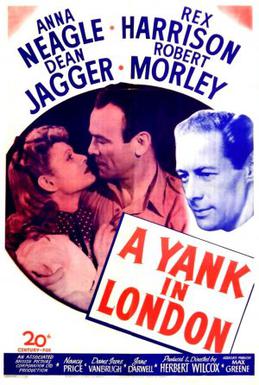
I Live in Grosvenor Square is a British comedy-drama romance war film directed and produced by Herbert Wilcox. It was the first of Wilcox's "London films" collaboration with his wife, actress Anna Neagle. Her co-stars were Dean Jagger and Rex Harrison. The plot is set in a context of US-British wartime co-operation, and displays icons of popular music with the purpose of harmonising relationships on both sides of the Atlantic. An edited version was distributed in the United States, with two additional scenes filmed in Hollywood, under the title A Yank in London.

Eliza Doolittle is a fictional character and the protagonist in George Bernard Shaw's play Pygmalion (1913) and its 1956 musical adaptation, My Fair Lady.
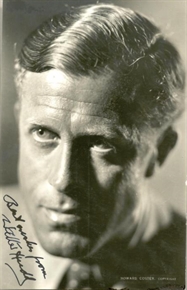
Walter Hudd was a British actor and director.
This is a summary of 1941 in music in the United Kingdom.

David Staller is an American theatre director and actor. He is the founding artistic director of the Off-Broadway theatre company, Gingold Theatrical Group.
